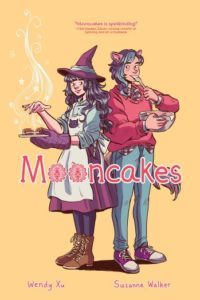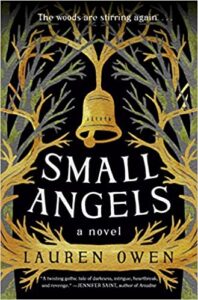Amazon Affiliate Link | Bookshop.org Affiliate Link
At the risk of being profoundly cliche (and profoundly redundant as I reviewed a graphic novel last month), I’ve decided to review Mooncakes.
I am not a spooky season gal. I’m a curl up with a cozy blanket and a hot cup of tea, watching Gilmore Girls by the light of a sandalwood scented candle while orange and yellow leaves fall outside my window kind of gal.
But somehow, I think this YA graphic novel is perfect for both kinds of autumnal gals. It tells the story of Nova Huang, a hard-of-hearing witch working at her aunt’s magical bookshop as she navigates mysterious mystical forces, rabid demons, and the sudden reappearance of her childhood crush Tam Lang, a nonbinary werewolf who needs Nova’s help.
This graphic novel is an absolute delight. The artwork is beautiful and cheeky, with expressive, evocative coloring and atmospheric detail. And the story is so heartwarming and entertaining! Part mystery, part romance, whole paranormal romp, Mooncakes is a captivating story that practically turns its own pages. The characters are empathetic and hilarious, and the relationships between them are so sweet. In fact, the whole thing is cozy. It’s the perfect quick autumnal read. It’s bite-sized, but it packs a punch of queer paranormal joy.
The writing is fast and witty, and the representation is off the charts. The world that Xu and Walker create is adorable, but also incredibly powerful: queer disabled witches, nonbinary werewolves, and a world with no homophobia or ableism that still manages to honor the complexities of these identities. They explore the nuances of what it means to have a queer sense of home; the powerful, nurturing friendships between young women; and even present an allusion to the epidemic of queer homelessness that is treated with tenderness and care.
It is such a comfortable, loving book. It’s a book about transformation and safety, and finding home in the people who love you. In my most humble opinion, it is the perfect read for any time of year, but especially for spooky season.
In fact, writing this review (while drinking tea and watching Gilmore Girls) is making me want to reread it all over again.
You can read more of Kelleen’s reviews on her bookstagram (@booms.books) and on Goodreads.


